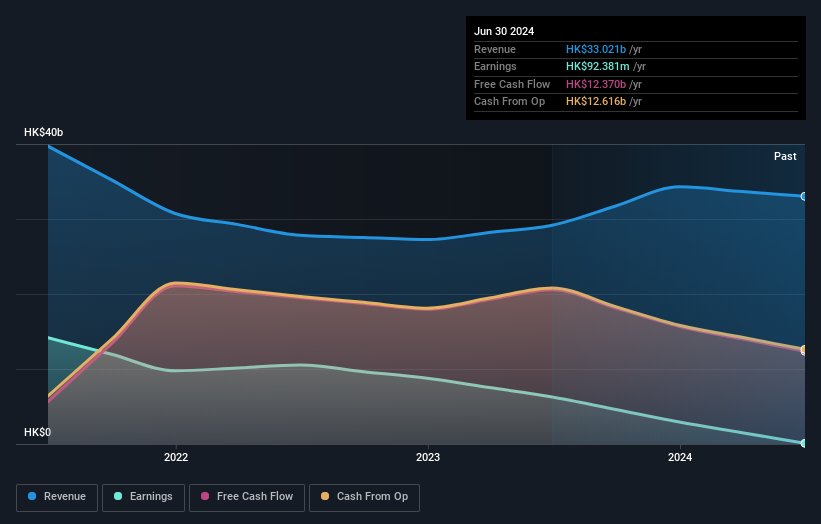
Key Insights
- Hopson Development Holdings' significant insider ownership suggests inherent interests in company's expansion
- The largest shareholder of the company is Mang Yee Chu with a 54% stake
- Ownership research, combined with past performance data can help provide a good understanding of opportunities in a stock
Every investor in Hopson Development Holdings Limited (HKG:754) should be aware of the most powerful shareholder groups. With 74% stake, individual insiders possess the maximum shares in the company. In other words, the group stands to gain the most (or lose the most) from their investment into the company.
As a result, insiders were the biggest beneficiaries of last week’s 4.2% gain.
Let's take a closer look to see what the different types of shareholders can tell us about Hopson Development Holdings.
Check out our latest analysis for Hopson Development Holdings

What Does The Institutional Ownership Tell Us About Hopson Development Holdings?
Many institutions measure their performance against an index that approximates the local market. So they usually pay more attention to companies that are included in major indices.
Less than 5% of Hopson Development Holdings is held by institutional investors. This suggests that some funds have the company in their sights, but many have not yet bought shares in it. If the company is growing earnings, that may indicate that it is just beginning to catch the attention of these deep-pocketed investors. It is not uncommon to see a big share price rise if multiple institutional investors are trying to buy into a stock at the same time. So check out the historic earnings trajectory, below, but keep in mind it's the future that counts most.

Hedge funds don't have many shares in Hopson Development Holdings. Our data shows that Mang Yee Chu is the largest shareholder with 54% of shares outstanding. With such a huge stake in the ownership, we infer that they have significant control of the future of the company. With 18% and 1.6% of the shares outstanding respectively, Yat Hong Chu and Wai Kin Au are the second and third largest shareholders. Wai Kin Au, who is the third-largest shareholder, also happens to hold the title of Member of the Board of Directors.
While studying institutional ownership for a company can add value to your research, it is also a good practice to research analyst recommendations to get a deeper understand of a stock's expected performance. We're not picking up on any analyst coverage of the stock at the moment, so the company is unlikely to be widely held.
Insider Ownership Of Hopson Development Holdings
While the precise definition of an insider can be subjective, almost everyone considers board members to be insiders. The company management answer to the board and the latter should represent the interests of shareholders. Notably, sometimes top-level managers are on the board themselves.
Most consider insider ownership a positive because it can indicate the board is well aligned with other shareholders. However, on some occasions too much power is concentrated within this group.
Our information suggests that insiders own more than half of Hopson Development Holdings Limited. This gives them effective control of the company. That means insiders have a very meaningful HK$9.8b stake in this HK$13b business. Most would be pleased to see the board is investing alongside them. You may wish to discover if they have been buying or selling.
General Public Ownership
The general public, who are usually individual investors, hold a 23% stake in Hopson Development Holdings. While this group can't necessarily call the shots, it can certainly have a real influence on how the company is run.
Next Steps:
While it is well worth considering the different groups that own a company, there are other factors that are even more important. Take risks for example - Hopson Development Holdings has 3 warning signs (and 2 which make us uncomfortable) we think you should know about.
Of course this may not be the best stock to buy. Therefore, you may wish to see our free collection of interesting prospects boasting favorable financials.
NB: Figures in this article are calculated using data from the last twelve months, which refer to the 12-month period ending on the last date of the month the financial statement is dated. This may not be consistent with full year annual report figures.
Have feedback on this article? Concerned about the content? Get in touch with us directly. Alternatively, email editorial-team (at) simplywallst.com.
This article by Simply Wall St is general in nature. We provide commentary based on historical data and analyst forecasts only using an unbiased methodology and our articles are not intended to be financial advice. It does not constitute a recommendation to buy or sell any stock, and does not take account of your objectives, or your financial situation. We aim to bring you long-term focused analysis driven by fundamental data. Note that our analysis may not factor in the latest price-sensitive company announcements or qualitative material. Simply Wall St has no position in any stocks mentioned.